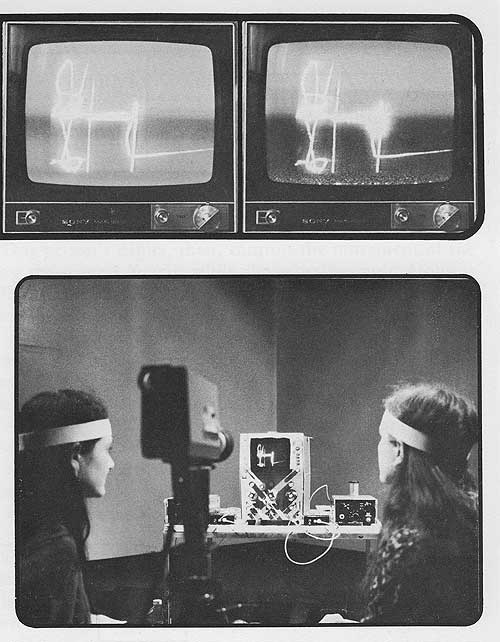View current page
...more recent posts
camille.pb on the interview I did with Paddy Johnson and Michael Bell-Smith last year:
...they discuss the traditional distinction between low art and high art and bring their new perspective, consisting in making the most out of easy webtools (via an interesting discussion of the animated gif's qualities for instance). The phrase Software art as I study [it] can be deceiving: one could think it has to do with super high-tech up-to-date and expensive software used by experts. Same for the word art, which could easily be interpreted by its application in the high fields of art history and institutions. When the two come together, though, here is the twist: they seem to degrade each other - and that's where the fun is: "art becomes web junk" says M. Bell-Smith. [...The artists] also develop a non-political stance, and it's interesting to find a way out of this boring debate of what is political art. It gives way to an idea of art practice that is not political by representation but by practice, by the context in which it is elaborated, by other stuff that the artist does and that he does not call art; Tom Moody's blog is filled with newspapers' extracts on american political life but in the interview he claims the right to political irresponsibility. I once heard the same words spoken by the net.art duo JODI: "the freedom to be irresponsible in front of one's computer," says Dirk Paesmans (in Matthew Mirapaul's 4/21/03 NY Times article "Distorting the digital mechanism").A good role model is the American proto-Pop abstractionist Stuart Davis, who was active politically but largely kept it out of his art. Writing in The New York School: A Cultural Reckoning, 1973, Dore Ashton tells an anecdote about his formative years, before the First World War:
[committed socialist John] Sloan was the artistic director of the radical magazine The Masses, to which Davis, Glenn Coleman, and Art Young contributed visual commentaries, based very often on their observation of the city, especially of the impoverished immigrants. Not long after Sloan arrived at The Masses, an ideological battle developed in which Max Eastman, John Reed, and Art Young insisted that only an art of "ideas" had a place in the magazine, by which they meant an art fully captioned. Art Young, whose life, as he wrote, was dedicated to the destruction of plutocracy, was an uncompromisig propagandist. Opposed to them were Sloan, Coleman, and the young Davis, who stood for "pure" art (genre scenes that needed no captions). In the dispute that ended his cartooning career, Davis learned, as he said, to be forever suspicious of "an art of ideas" and in fact, even when he was in the thick of political agitation later in the thirties, he never again brought his art and politics together.(To reiterate what I said in the interview: "Art should be like dreaming, and dreams don't always take us to good places, or places we want to go. Is it good for art to be 'apolitical' when the country is being driven off a cliff by fools? One person's frivolous pleasure states could be another's rejection of, or opting out of, the dominant control systems. I'd rather allow art to be 'immoral' and 'irresponsible'--and then analyze why I feel that way.")

Poster by T. Hallenbeck for Nasty Nets Los Angeles event. No idea what this event is about except that my left coast sisters and brothers will kick the asses of rival surf club supercentral.
From musician/popstar Thomas Dolby's blog. He recently attended the TED conference (Technology, Entertainment and Design) and lists this as a highlight:
-My Indian buffet lunch table today with Richard Branson, Peter Gabriel, Hans Rosling and Darryl Hannah (!) as they discussed how to get the world’s "Elders" into war situations to help resolve conflictsLimousine liberals, e-e-ew. Surely we've learned from Iraq that there are no Elders, and the main beneficiaries of "getting us into war situations" are arms merchants, support for whom needs to be ratcheted down, not up. In fairness to Dolby, he possibly means negotiation, not troop involvement in foreign conflicts, but it's doubtful.
"Bonsoir Bonaire" [mp3 removed]
The Pro 53 (softsynth) has a nice e-piano sound. Here it's layered over a bed of growly autopanning sawteeth and random bipolarly tuned snares. Will eventually run out of Caribbean islands to use as titles, but I like that Google translates Bonaire as "good surface."
Some excerpts from Alan N. Shapiro's forthcoming book TV’s "Lost": The Crash Out of Globalization into the World:
In my media studies writing on Lost, I continue my project of inventing the literary genre of theory-fiction that I began in my book Star Trek: Technologies of Disappearance...writ[ing] first-person phenomenological narratives of what each of the 14 major characters of Lost is feeling, perceiving, thinking, and experiencing from moment to moment. [...]Woven into Shapiro's cyber-fanfic sketches are autobiographical passages, a hilarious Marxist takedown of Defoe's Robinson Crusoe, and an aeronautic prequel channeling Charles Lindbergh's first Transatlantic voyage, all relating to Lost's themes of flight, trauma, and survival (having only read the wildly un-linear excerpt we trust that the author will pull all this together). The close reading of episodes and willingness to see beyond their TV trash status to bigger issues is what made the Star Trek book so successful--it's the viewpoint of a skeptical fan, perfectly situated to explain why these series have become contemporary mythology, for bad or good. On the "unexamined psycho-biographical wound" that Jack wakes up with after the crash:
All of the[m] - male and female - are my sexual identity avatars. They are virtual reality body-suits that I freely robe and disrobe. I inhabit their bodies and clothing as I choose. I exist inside their semiotic silhouettes. [...]
As the Pilot Episode begins, I wake up from oblivion as Alpha Male Jack Shephard, supine and homeless alone in the woods after a devastating aviation accident. It is my very first arrival in this particular virtual party-experience scene-space, a personal appearance financed by part of my Cable-TV subscription monthly fee, and enabled by the technological meat-machine interface of my image-saturated commodity mind. I exit the transient wormhole-like void of precision-instrumented passage between worlds quantum-leapt into an initiatory moment of surprising arousal. From now on, whatever Jack sees, feels, touches and hears, I see, feel, touch and hear. I am Jack. Jacked in.
Countless contemporary TV shows and Hollywood films portray America's exemplary heroes: emergency physicians, homicide detectives, attorneys for the defense, secret service agents, counter-terrorism specialists, life-risking firemen or beat cops. These daring occupations encompass weighty responsibilities and are undoubtedly among the noblest of vocations in today's society. But the omnipresent virtual realities of the media propagate an iconography of the trained practitioner who "does good" or "helps others" that half performs the commendable service of showcasing worthy role models and half does the disservice of manufacturing a manipulative mythology of the obligation to make excessive macho self-sacrifices for the public interest.The Crash Out of Globalization, then, is, among other things, landing on the island and confronting this compulsive workaholism of a life that no longer exists. One's only fear is the series may be overwriting the writer as it morphs in Seasons 2 and 3 from a post-technological survivalist narrative to a Lost in Space-like scenario teeming with abandoned spooky gear, spacetime abnormalities, and a steady stream of weird visitors that manage to heat the rat race right back up. Shapiro's challenge is to make his narrative so powerful that people will only think of the bucolic, pre-Dharma episodes when they envision the series.
The small and big screens hook us seductively into the pervasive workaholism corresponding on the level of the individual to what the German philosopher Martin Heidegger - in his 1936 essay "The Age of the World Picture" - correctly diagnosed as being the plague of modern times: the characteristic bustle or constant "industrious activity of mere busyness" of our oppressive institutional existence. Permanently enchained by the everyday life ideology that constrains me to make my contribution to business, family, nation, or the accumulation and spending of money, I operate nonstop in a pumped-up feverish caffeine-assisted trance of work and consumerism in order not to face myself. I never have to ask the terrifying question of what I would do with my life if I were truly free. Especially as a man, I steer clear of contact with my own feelings and emotions, evade looking sincerely into my own psycho-biographical pain, and fail to develop real self-love...
Related, more solipsistic Lost thread--one man's lonely vigil.

Jacqueline Humbert, Brainwave Etch a Sketch, 1974. "One person's Alpha waves control the movement of a dot along the oscilloscope's X axis, while the other person's are responsible for movement along the Y axis. The resulting form of the drawing depends on the degree of cooperation, sensitivity and agility in consciously controlling brain signals that the two participants are able to achieve with each other." (Quote and photos from Biofeedback and the Arts, 1976, ed. by David Rosenboom)
A blogsitter over at The News Blog while Gillliard is in the hospital (Get well Steve!) has floated a "best science fiction/fantasy books" list that seems a bit heavy on old "hard science" dudes such as Asimov, Heinlein and Clarke. In the comments yours truly tried to add some dystopian/visionary/cyberpunk spice (including a scattering of books written after--gasp!--1980) with these suggested additions:
A.A. Attanasio - The Last Legends of Earth, Radix
Alan Moore/Dave Gibbons - Watchmen
Brian Aldiss - Non-Stop, Hothouse
Philip K. Dick - Ubik, Martian Time Slip
J.G. Ballard - The Crystal World, High Rise
Pohl & Kornbluth - The Space Merchants, Wolfbane
Bruce Sterling - Schismatrix Plus, Heavy Weather
The Strugatskys - Roadside Picnic
Stanislaw Lem - Solaris
Greg Egan - Quarantine
Greg Bear - Blood Music
Octavia Butler - Earthseed novels
Michael Swanwick - The Iron Dragon's Daughter
Doris Piserchia - Doomtime
John Brunner - The Shockwave Rider
Lem, Butler, Pohl & Kornbluth, Brunner, and various Dicks already had their indignant supporters in the comments--just tossing in this blog's two cents on those authors. Cordwainer Smith would be on the list except his best work is in the short story format. H.P. Lovecraft's At the Mountains of Madness, Poe's The Narrative of Arthur Gordon Pym, and H.G. Wells' The Island of Dr. Moreau are some late thoughts.
"Mouse Party 2" [mp3 removed]
Back to the sampler--these are sampled drum hits from the Vermona rhythm synth, using the "kit" made last summer. Tried a couple of new things: making midi controller curves change the snare's pitch and tuning a "chime" (itself a chord) so it could be played like a piano (the melody's pretty basic). A few effects added here and there. Most of the rhythmic interest comes from the "claps."
Update: Discovered this was clipping slightly. Fixed that, and fattened up the sound a bit.
